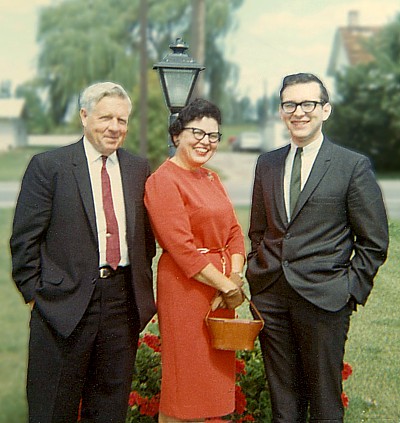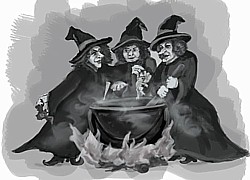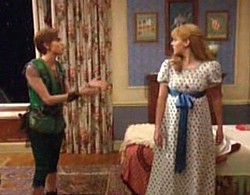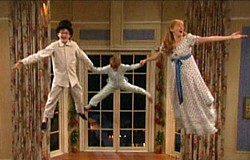DEC.
31, 2019 ![]() TURNING A PAGE ON THE CALENDAR
TURNING A PAGE ON THE CALENDAR
To calculate a person's age, one takes the current year (2019, for example) and subtracts the year of birth (1958, for Michael Jackson). Had he lived, Jackson would now be 2019–1958 = 61 years old.
Two decades ago as the year 2000 approached, someone noticed that computers typically truncated the date. To save memory space, years were often represented by merely their final two digits. It was feared that in the new millennium, Jacko's age would not be computed as 2000–1958 = 42 years but rather as 00–58 = negative 58 years. Planes would fall from the sky.
People were in a panic about the problem, which was called Y2K (for Year 2,000). Remember? This article explains it. Hardworking computer scientists fixed things just in time, mostly.
|
|
Steve Lieber says, “I think the only thing we learned is that if a bunch of people work really hard to stop a problem from happening, lots of other people will assume it was never really a problem.” The caption for that article's illustration references “the T2K bug.” T2? How dare they?! I myself am known as T2, derived from my Tom Thomas initials. |
On October 11, 1999, eleven weeks before the Y2K apocalypse, I signed up for this newfangled service called email. What would be my address? I made a list of “Yahoo! ID” possibilities. I started trying to sign up, but the first option (t2) was already taken. So was tomtom. I was also unsuccessful with the trendy-sounding t2k, but Yahoo suggested that t2k_us was available. Therefore, that's what I chose.
|
Anyway, letters that I wrote around that time are in this month's 100 Moons article. They reveal that the only anomaly I noticed was one software utility that rolled over the year from “99” to “100.” |
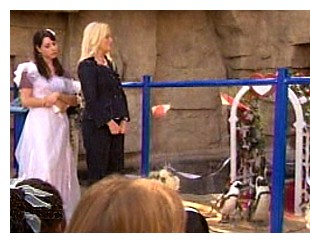
Last night NBC rebroadcast the September 17 season premiere of Amy Poehler’s sitcom, Parks and Recreation.
In this episode, her character Leslie Knope promoted the local zoo with cute faux ceremonies for the animals, such as “birthday parties” or “graduations.” There was a “wedding” for Tux and Flipper, a pair of newly acquired penguins. But then someone pointed out that both penguins were male.
(Some fundamentalists, convinced that homosexuality is a deliberate sin against God's law that only willful humans can commit, refuse to believe that God could have created gay penguins. But apparently He did. And penguins mate for life.)
The Society for Family Stability Foundation, accusing the zoo of endorsing gay marriage, demanded that Leslie “separate the penguins, annul the marriage, reimburse the taxpayers for the cost of the wedding, and then resign.”
She did none of that; instead, she transferred the birds to a zoo in Iowa, where gay marriage is legal.
During the commercial breaks, the writer in me couldn’t resist sketching out a serious speech for Leslie.
Dearly beloved, when we gathered together at the penguin exhibit, I made an error — not a political statement.
Had I known both Tux and Flipper were male, I would not have pretended to marry them. Whatever our opinions on gay marriage, we know a wedding for two male birds will be controversial. And our zoo doesn’t need controversy. I’m sorry for that.
The SFSF has made four demands. However, I must reject them all.
I will not resign. I’ve learned from my mistake.
I will not reimburse anyone. We all volunteered our time, so there’s nothing to reimburse.
I will not annul the marriage. I have never had the authority to marry or unmarry anyone or anything, so there’s nothing to annul.
Finally, I will not separate the penguins. Instead, they’re on their way to live happily together in a more tolerant part of our country.
Tux and Flipper are two of God’s creatures. Irrespective of any of our human customs, they have mated for life. That is their nature.
What God hath joined together, let not man put asunder.
DEC.
26, 2009 ![]() 'TIS
THE DAY AFTER CHRISTMAS
'TIS
THE DAY AFTER CHRISTMAS
On the second day before the holiday, our hockey announcers wanted to express the number 9 in the “Twelve Days of Christmas” format. But no one was sure what the ninth gift was supposed to be. Nine lords a-milking? Probably not. Two members of the production staff looked it up on the Internet. One found “nine ladies dancing”; the other found “nine drummers drumming.” I had not realized that there are different versions.
On the first day before Christmas, I went online myself and learned more about this song.
|
|
The opening verse seems nonsensical. A partridge nests on the ground, never “in a pear tree.” Also, fruit trees cannot be easily delivered, even as gifts. However, in France “a partridge” is une perdrix, pronounced “unna per-dree.” To an Englishman, that sounds like a Gallic-accented “in a pear tree.” One can imagine the original version, first in France and later in England:
|
|
|
Finally, on the first day of Christmas I found a blog entry that reminded me of my own experience, growing up as an only child in a happy family. (We're pictured here in 1967.) Mark Evanier on December 25 wrote the following reminiscence about his family: |
Christmas was a special day but it wasn't as special to us as it seemed to be to others. I was well into my twenties when I figured out what was going on there. I was then going with a lady who dragged me into her family Christmas arrangements that year. Hours...days...whole weeks were spent planning the parties, the dinners, the gatherings. She spent cash she didn't have to buy gifts and purchase a new party-going outfit for herself...and the decorating took twice as long as Michelangelo spent painting the ceiling of the Sistine Chapel.
It seemed to me more like a chore than a celebration, and one night I asked her why she went to so much trouble. She said, "Christmas is important. When I was a kid, it was the one time of the year when we all got along...or came close to getting along."
There it was. She'd come from a large and dysfunctional family. Siblings were forever fighting. Parents drank and split up and got back together and screamed a lot and separated again. There was much yelling and occasional violence...
...but not as much at Christmas. Christmas was when they managed to put most of that aside. Christmas was when they generally managed to act the way they should have acted all year. That was why, when it came around, they made so much of it.
We never had to declare a holiday cease-fire in my family. We always got along. There was very little arguing between my parents or between them and me, and what little occurred never lasted long. I never had fights with brothers or sisters because I never had brothers or sisters.
I never in my life wished I had a brother or sister. Never for one second. When I went to the homes of friends who had siblings, I only heard screaming and yelling and fighting over belongings...and envy from my friends that I had my own room and the undivided love and attention of my parents. (Evanier November 8, 2012)
My folks and I were known to give each other gifts for no special occasion and to occasionally get the whole (small) local family together for a big meal. So Christmas wasn't that much different from the way we lived all year.
A year or two ago, I told a friend all of the above and his reaction was on the order of, "Gee, too bad for you." Because in his household, Christmas was wondrous and festive and the source of most of his happy childhood memories. I never saw it that way. I have loads of happy childhood memories. They were just no more likely to occur around Christmas than at any other time...and I liked it that way. I mean, you can have Christmas once a year or you can have it 365 times a year. Peace on Earth, good will towards men doesn't have to stop later tonight.
|
DEC.
23, 2019 Did you know that Jimmy Stewart wrote a philosophical dissertation on demons? Did you know it appeared more than four centuries ago? Did you know that its fretting about black magic resulted in witches being included in the Bible? |
|
Jimmy's text begins: “The fearful abounding at this time in this country of these detestable slaves of the Devil, the Witches or enchanters, hath moved me (beloved reader) to dispatch in post this following treatise of mine, not in any wise (as I protest) to serve for a show of my learning and ingenuity, but only (moved of conscience) to press thereby, so far as I can, to resolve the doubting hearts of many: both that such assaults of Satan are most certainly practiced, and that the instruments thereof merit most severely to be punished.”
He adds: “To make this treatise the more pleasant and facile, I have put it in form of a Dialogue.” I myself often choose to frame my writings as an imagined conversation between two people.
|
|
But of course I'm not referring to Jimmy Stewart, the actor. I speak instead of James Stuart, King of Scotland. He published DÆMONOLOGIE — or to use modern spelling, Demonology — in Edinburgh in 1597. It was subtitled “In Form of a Dialogue, Divided into Three Books.” The typography of the title page is what catches my eye. The printer wanted to set the title in his largest font, but apparently he couldn't fit all the characters into a single row. Therefore, after a hyphen, the last syllable of the title ended up in a smaller font on the next line, shared with the beginning of the subtitle. Not cool. However, to be fair, in Britain the art of printing was still only about 120 years old. |
|
|
In 1603, after the death of Queen Elizabeth I, the Scottish and English crowns were united. That meant that the demon expert was now England's King James I (of Bible fame). Naturally, the book “written by the high and mightie Prince” was reissued in London that very same year. This time, the title was reduced in size, “In Form” received the largest type, and “Dialogue” ended up being hyphenated. Also not cool.
William Shakespeare must have read this best-seller. Portions of it inspired his depiction of “secret, black, and midnight hags,” the three Scottish witches, in a play first performed in 1606: Macbeth. |
Then in 1611 the King James translation of the Bible was published, “replacing the Hebrew words for idolaters, mediums, sorcerers, and ghost whisperers with the English word witch. In Hebrew, there was no such word.” That's according to Salvatore Prisco, an emeritus professor of humanities from Hoboken.
Dr. Prisco continues, “An example of this usage can be found in 1 Samuel, chapter 28, in which the King James Bible has Saul going to the witch of Endor to contact the spirit of Samuel, while the Hebrew, Greek, and Latin versions have Saul visiting ‘a woman with a divining spirit.’ She hardly acts the role of a witch. The King James Bible conditioned Puritans and Anglicans alike to be obsessed with demons and witches, thus prolonging a medieval mind-set among common folk.”
In America, the Salem witch trials would begin in 1692.
Thanks a lot, Jimmy.
Betty White understands what Nikita meant.
I finally got around to watching the October 29 episode of the NBC comedy 30 Rock, in which the much younger Tracy Jordan hopes he will outlive Betty. “Nice try, Jordan!” she retorts. “But I am going to be at your funeral. I will bury you.”
The allusion was to a famous remark by Nikita Khrushchev, premier of the Soviet Union. As a Communist, Khrushchev believed what Karl Marx taught: in the same way that feudalism was replaced by capitalism, eventually capitalism will be superseded by communism.
At a reception at the Polish embassy in Moscow on November 18, 1956, Khrushchev spoke to Western diplomats about the idea of peaceful coexistence. “Whether we exist doesn't depend on you. If you don't like us, don't accept our invitations, and don't invite us to come to see you. Whether you like it or not, history is on our side. We will bury you.”
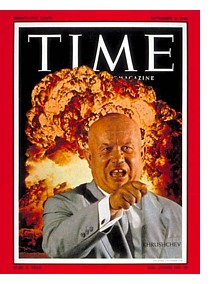 “We
will bury you!” Paranoid Americans took this as a direct
threat. I remember that politicians like Barry Goldwater
exploited our fears. Time put a belligerent Khrushchev
on its cover, a hydrogen bomb exploding behind him. He was
depicted as dangerously aggressive, an arrogant bully who planned to
utterly destroy America and bury us under the earth.
“We
will bury you!” Paranoid Americans took this as a direct
threat. I remember that politicians like Barry Goldwater
exploited our fears. Time put a belligerent Khrushchev
on its cover, a hydrogen bomb exploding behind him. He was
depicted as dangerously aggressive, an arrogant bully who planned to
utterly destroy America and bury us under the earth.
Even as a young boy at the time, I realized “We will bury you” meant “We will attend your funeral,” not “We will cause your funeral.” Khrushchev was predicting that America would collapse of its own accord, due to internal faults like class warfare and immorality, while the Soviet Union would survive. In Marx’s view, the Western economic system inevitably dies a natural death, and “the proletariat is the undertaker of capitalism.” Khrushchev was merely saying, “When you are dead and ready for the grave, the Soviet Union will be there to do the burying.”
Of course, he was wrong. But that’s another story.
DEC.
17, 2019 ![]() MIND YOUR PAEONS AND SPONDEES
MIND YOUR PAEONS AND SPONDEES
Is there a word for a mismatch between the rhythm of a melody and the natural rhythm of the lyrics? Consider these lines by British poet Ray Davies. When spoken, the stress usually falls on every second syllable, as in iambic tetrameter.
|
I |
al- |
|||
|
ways |
want |
|||
|
to |
be |
by |
||
|
your |
side. |
|||
|
You |
got |
|||
|
me |
so |
|||
|
I |
can't |
sleep |
||
|
at |
night. |
They're from “You Really Got Me,” the first hit of his band The Kinks, released six weeks after his 20th birthday back in 1964. But the corresponding tune approximates fourth-paeonic dimeter, with the stress falling on the fourth and eighth syllables.
|
I |
al- |
ways |
want |
|||
|
to |
be |
by |
your |
side. |
||
|
You |
got |
me |
so |
|||
|
I |
can't |
sleep |
at |
night. |
Together with the bold five-note guitar riff on the title, those hanging ninth syllables give the music a weird charm. Here, listen. “YOUR side. AT night.” When the Kinks first performed the song, Davies has said, “people actually took notice. They realised we had something original.”
DEC.
15, 2019 ![]() SIX SIXFOLD DOUBLES
SIX SIXFOLD DOUBLES
My father was once a bookkeeper. The word “bookkeeper” famously boasts three consecutive double letters.
But when veteran puzzlemaker Peter Gordon composed the November 17 Sunday Crossword for the New York Times, he came up with six consecutive double letters. And he did it six times! The trick was not limiting himself to a single word.
Just for fun, I've shoehorned his six multi-word combos into a semi-sensible sentence. It's about unemployed opera singers, recently laid off and in need, who've had to find something else.
|
|
|
|
|
Now a soprano doeS SAAB BOOKKEEping |
||
|
while two contraltos have become QuEEN NOOR ROOMMates |
||
|
and tenor IsAAC COOLLY YEEhaws at rodeos, |
||
|
|
|
|
|
but others joined the Y, where, seeing a swiM MEET TEEN NEEdled, |
||
|
the baSSI IN NEED DOOdled about |
||
|
how their fellow enroLLEES SEEM MEEk. |
||
|
DEC.
12, 2019 Jesus referred to himself as “the Son of Man.” What did he mean by that? In Matthew 16:13-16, he inquired, “Who do people say that the Son of Man is?” Back then some guessed he was a reincarnated prophet. Nowadays we sometimes describe him as a flesh-and-blood person, while at other times we call him part of the divine Trinity. |
|
Jesus wasn't satisfied with the responses. “What about you?” he asked his disciples. “Who do you say I am?”
Peter replied confidently, “You are the Messiah, the son of the living God.”
But what is a messiah, exactly? What does it mean to be God's offspring? Surprisingly, despite fundamentalists' belief that the Bible is without error, the “divinely inspired” Good Book gives us conflicting answers to the key question: Who was Jesus?
|
|
One of the Gospels tells of a human teacher proclaiming that although God our Father is in Heaven, he will soon make his Kingdom come down here on Earth. In another, Jesus claims that he himself is God — and has been always been so, since the Creation! If we're credulous enough to believe that, we'll never die. We'll rise from Earth and join him up there in Paradise. Brother Billy has invited two unusual Christians to appear on his latest program to discuss these Crossed Messages. |
DEC.
9, 2019 ![]() I HEARD FROM LEON (NOEL)
I HEARD FROM LEON (NOEL)
Leon asked, “Remember my college dormitory?” (Dirty room.) “My roommate and I each had snooze alarms.” (Alas, no more Zs.) “We liked to figure out anagrams; sometimes the solution hits you right between the eyes.” (They see.) “Ken Levine posted at least a dozen freaky anagrams on his blog — no, make that twelve plus one.” (Eleven plus two.)
“Anyway, I decided to become a geologist after that queer shake.” (The earthquakes.) “But on a big test, I forgot a decimal point.” (I'm a dot in place.) “So then I became an astronomer.” (Moon starer.)
“And then came the 2000 Presidential race, Al Gore versus George Bush.” (He bugs Gore.) “An election frequently ends in animosity.” (Is no amity.) “There was some dispute about the election results.” (Lies! Let's recount.)
“I was into ham radio, so I taught my bride the Morse code.” (Here come dots.) “She and I went to a casino, but we went broke playing the slot machines.” (Cash lost in me.) “My father-in-law took it in stride; he's a Presbyterian.” (Best in prayer.) “On the other hand, his wife was a typical mother-in-law.” (Woman Hitler.) “Now I'm penniless and lost in desperation.” (A rope ends it.)
DEC.
6, 2014 ![]() WAY
UP HIGH, SUDDENLY HERE AM I
WAY
UP HIGH, SUDDENLY HERE AM I
Watching NBC's production of Peter Pan got me thinking. I imagined I was a youngster attending a live stage performance, with no prior knowledge of what was about to happen.
The play starts a century ago in a conventional way, with characters conversing in English accents about domestic matters. Then a strange boy enters through a window and tells strange stories about his home in a strange place called Neverland.
|
DEC.
4, 2019 Time for another post about complicated intersections I've recently figured out. Sometimes I get a hankerin' to hop in my car and head out to get some of that good ol' country ham. There are three Cracker Barrel restaurants within twenty-some miles of my apartment, but I've found the farthest drive to be the most challenging. |
|
|
That requires taking the Pennsylvania Turnpike southeast to westbound Interstate 70 and then hunkerin' down at Exit 57. This interchange has been improved in the past couple of years. |
|
|
|
|
When I arrive at the circle, another sign on the left warns me that “traffic from left does not stop.” But the signs don't tell even half of the story. The new interchange features a double traffic circle! |
|
|
After the first 270° (shown in green), I'll tunnel under the Interstate and immediately make another 200° around a second circle (shown in red). From there, eschewing the first egress to Hunker, I'll descend the second ramp. That will deposit me onto West Pennsylvania Avenue in New Stanton, where the restaurant resides. To head home afterwards, getting back on the Interstate will be much easier, requiring only a white ramp on my right (preferably the first one) and then a gold ramp. But I still haven't told you the whole story! |
|
Remember that yield sign warning of non-stopping traffic from the left? On the map above, I've depicted said traffic as a big black arrow entering the underpass. It's hidden from my yield sign because of the huge embankment that holds up the Interstate. I must carefully creep up to the four white triangles. There I make not a yield but a full stop. I lean forward over the steering wheel and look to my left, as far as I can. Seeing nothing so far, I then hit the gas to proceed double-time into the traffic circle before I'm clobbered by a not-yet-visible oncoming truck.

It would be safer if all of the “green” circle could see all of the “red” one through the underpass. The highway engineers should have made the embankment shorter and built the bridge longer. However, doing so would have cost slightly more of our tax dollars.
You’ve
heard of the Viking explorer and real estate salesman known as Eric
the Red. To entice settlers from Iceland to move to his new project, he named it Green'land.
Later his son, Leif Ericsson, also became a famous explorer.
new project, he named it Green'land.
Later his son, Leif Ericsson, also became a famous explorer.
You may not know about the rest of Eric’s family. He had two daughters, Helga Ericsdottir and Freydis Ericsdottir. There was also another son, Rudy Ericsson, who was called Rudolph the Red because of his resemblance to his dad.
After Eric the Red and his family established a settlement on Greenland in the year 986, his son Rudy sent for his new wife to join him. However, when she arrived, she discovered she had been the victim of her father-in-law’s false advertising. This land wasn’t green. On the contrary, it was covered by a huge glacier. And the weather was even more inhospitable than it had been back home.
Rudy tried to convince his bride that Greenland wasn’t as gloomy as she thought. “You’ll see,” he said. “Conditions will improve once the rainy season is over.”
“Rainy season?!” she exclaimed. “This stuff falling from the clouds isn’t rain. It’s frozen!”
“No, it’s rain,” he reassured her.
“It’s sleet and snow!”
But her husband was insistent. “Rudolph the Red knows rain, dear.”
|
2019 UPDATE: I first heard this punch line 60 years ago, but in those Cold War days “Rudolph the Red” was a Communist from Moscow. By the way, CBS-TV will repeat the animated classic Rudolph the Red-Nosed Reindeer at 8:00 ET tonight — just as it did on this date in 2009! |
 DECEMBER
2019
DECEMBER
2019






